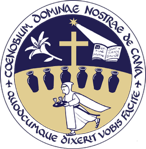Father Pius Mary Noonan’s homily
Notre Dame Priory
16th Sunday after Pentecost

Holy Name of Mary
In today’s epistle we hear St Paul make mention of his captivity and plead with the Ephesians not to lose heart because of his tribulations. In today’s Gospel we see Our Lord not only perform a miracle that scandalises the Pharisees, but actually go further and reprehend them for their vices. We know also that this attitude of Our Lord will ultimately lead to His being rejected and crucified. A question arises when we reflect upon these examples. Would it not have been more advisable to use a bit of diplomacy, to enter into dialogue with those in authority rather than clashing with them? If Paul had been willing to tone down just a bit his preaching, he may never have been imprisoned in the first place, and he could have gone on preaching for many more years. If only he could have accepted that there are other approaches and that there might be other gods than Jesus Christ, if only he had reassured the Jews that they didn’t really need to accept Jesus as Messiah since they had the Torah with its life-giving precepts. And Our Blessed Lord, if He had only been quiet about the evil doings of the Pharisees, if He had looked over their vices and let them be comfortable in their role, He could have had a much longer career and would not have been condemned as a criminal. Just imagine if Jesus had lived another 50 years, the effect He could have had on the world!
These considerations give us food for thought. They force us to ask what was at stake. They oblige us to ask, not so much why they did what they did – for we know that their example is irreproachable – but rather why for them there could be no compromise. Why was it so important for Paul to preach Jesus, and Jesus Crucified as the only Saviour? Why was it necessary for Our Sweet and Gentle Saviour Himself to chastise the hypocrisy of the Chief Priests and condemn their vices publicly? And we might add the example of St John the Baptist who lost his head because he could not keep his mouth shut, but just had to go and tell King Herod he had no right to live in adultery with his brother’s wife.
In his encyclical Veritatis Splendor, Pope Saint John Paul II, after reaffirming with great clarity the Church’s moral doctrine, proposed the example of the martyrs as being proof that when it comes to God’s law, there are no exceptions; if one truly loves God and does not want to deny Him, one is sometimes put in a situation in which there is no middle ground between apostasy and heroism.
The example of Susanna is particularly eloquent. The story is told in ch. 13 of the Book of Daniel in which she is portrayed as being the object of the passion of two corrupt judges who trap her when she is alone and solicit her to commit adultery with them. If she refuses, they will accuse her of adultery and have her stoned to death; if she accepts their lustful advances, she violates the commandment of God: “I am hemmed in on every side. For if I do this thing, it is death for me; and if I do not, I shall not escape your hands. I choose not to do it and to fall into your hands, rather than to sin in the sight of the Lord!” (Dan 13:22-23). The Pope comments: “Susanna, preferring to fall innocent into the hands of the judges, bears witness not only to her faith and trust in God but also to her obedience to the truth and to the absoluteness of the moral order. By her readiness to die a martyr, she proclaims that it is not right to do what God’s law qualifies as evil in order to draw some good from it. Susanna chose for herself the better part: hers was a perfectly clear witness, without any compromise, to the truth about the good and to the God of Israel. By her acts, she revealed the holiness of God” (Veritatis Splendor no. 91).
I am hemmed in on every side, she says. She was between a rock and a hard place, between fire and water, between apostasy and heroism. Susanna made the right choice, the only right choice, the heroic choice, in a matter in which it was either deny her conscience and lose her honour, or lose her life. She remained faithful to what she knew to be true and holy, and accepted to be slandered and die a horrible death, even though in her case God intervened through the prophet Daniel and the wicked devices of those corrupt leaders were turned against them; they fell into the very pit they had dug for her.
Like Jesus Our Lord, like St Paul and all the other apostles, like Susanna, like John the Baptist and legions of other martyrs, that is to say, witnesses to the truth, we too can find ourselves in similar situations. Many of us do today, and many more of us will tomorrow, as the tentacles of evil surround us and seek to squeeze the life blood out of us. By “life blood” I mean our moral conscience. The Catechism of the Catholic Church teaches that “a human being must always obey the certain judgment of his conscience. If he were deliberately to act against it, he would condemn himself” (no. 1790). To act against conscience in grave matter is to not only commit a mortal sin, it is to condemn oneself to perpetual remorse. Susanna knew that if she had consented to lie with those wicked men, no one would have ever known it, but she would not have been able to live with herself.
One might reply that God does not ask so much, that He understands our weaknesses and condones our choices, especially when we really have no option. It might even be suggested that to resist is to make a show of pride. Actually, if resistance to lawful authority commanding lawfully would indeed be a show of pride, resistance to an unlawful command is in reality a show of humility. St Ignatius puts it this way: “The first kind of humility is necessary for salvation. It consists in this, that as far as possible I so subject and humble myself as to obey the law of God our Lord in all things, so that not even were I made lord of all creation, or to save my life here on earth, would I consent to violate a commandment, whether divine or human, that binds me under pain of mortal sin” (Spiritual Exercises, no.165). In other words, the refusal to commit a mortal sin, even in a situation of the gravest duress – “to save my life” – gives proof that I have the minimum humility required to be saved. It makes manifest that I know that I am a creature with duties to my Creator, duties which trump every other duty, even of the greatest importance from a human perspective.
And here we can see the connection with the second half of today’s Gospel in which the Lord gives the Pharisees a lesson in good manners and in humility. If you are invited to a banquet, do not have the pretension to take the first place; do not put yourself forward, do not seek to give yourself a role you do not have; take the place God has assigned you, cleave to it, love it, even though it be the lowest of places. If you humble yourself, God will exalt you, He will strengthen you interiorly.
And here we come back to the rest of St Paul’s letter to the Ephesians where he prays that they “be strengthened by his Spirit with might unto the inward man: that Christ may dwell by faith in their hearts, being rooted and founded in charity” (Eph 3:16-17). The soul that humbles itself before God learns the art of love, it plunges deep roots in the garden of love, and those deep roots make it immoveable, unshakeable; humility fills the soul with the Holy Spirit, that Spirit whom St Peter assures us rests upon those who suffer for the name of Christ: “If you partake of the sufferings of Christ, rejoice that, when his glory shall be revealed, you may also be glad with exceeding joy. If you be reproached for the name of Christ, you shall be blessed: for that which is of the honour, glory and power of God, and that which is his Spirit resteth upon you” (1 Pt 4:13-14). And so my dear friends, fear not, for the hairs of your head are all numbered. Your Father in Heaven, from whom all paternity on earth is derived, has counted them, and not a single one falls to the ground without Him allowing it to happen.
A final word about today’s feast, overshadowed by the Sunday but still very much present in our hearts. We honour on this 12th of September the Holy Name of Mary, that sweet Name which is that of our mother, and which recalls all the mysteries enclosed in her virginal and maternal heart, that Name which terrifies the devils and puts to flight all his evil servants, that Name which they cannot bear to hear, as it summarises all the infinite power of God can realise in a little soul. Yes, Mary’s soul is the littlest of all, the smallest, the humblest, and that is precisely why she is elevated above all.
This feast commemorates the great victory won through the power of Our Lady of Victories by the King of Poland John Sobieski over the Turks in Vienna in 1683. Like at the Battle of Lepanto a century earlier, the Christian armies were outnumbered two to one. But God does not need numbers. All He needs are a few humble, strong souls upon whom His Spirit rests and through whom He can achieve all things.
Fear not, little flock. Stand firm. As the battle intensifies and as the dark traits of the enemy become more and more visible in the growing tyranny that weighs upon us, the hour of Our Lady’s triumph approaches. It is precisely because it approaches that the enemy knows he has little time and is showing his full hand. We know from the Gospel that the time of the trial will be shortened.
Do not be afraid. That is the enemy’s tactic, for he is in perpetual darkness and fear. Rejoice in the presence of the Holy Spirit in your hearts. Look up to the star. Call upon Mary. Make sure you stay under her mantle. There is nothing to fear there. Amen.









